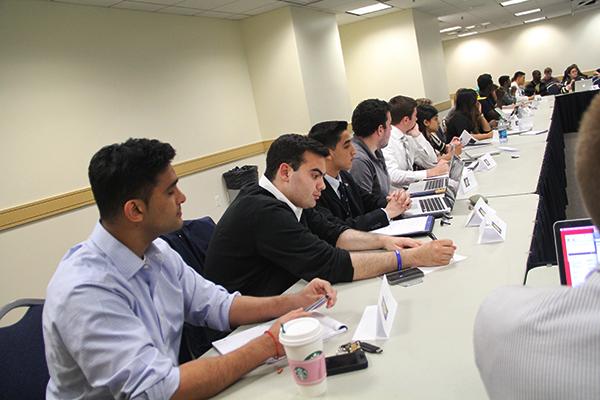Scott Spector launched a quasi-campaign for an Elliott School of International Affairs graduate student senator seat last year when he opened his email and saw a blank ballot.
While most undergraduate senators spend two weeks campaigning with posters, palm cards and T-shirts, spending up to $1,000, Spector was elected after he asked a few friends to write in his name.
“In my four years at GW as an undergrad, I never saw one graduate senator campaign poster,” said Spector, now a first-year master’s student. “I said to some friends, “Write me in,” and now I’m a senator.”
Blank slots frequenting the graduate student ballot have left the SA with a recurring problem: Elected students who earn their place from write-in votes tend to be less invested in the SA, and several typically resign, leaving spots to be filled in the fall from a pool of often-disinterested students.
This year, three graduate senators have left their Student Association positions before the first meeting of the year.
Center for Student Engagement Director Tim Miller, who has advised the SA for about a decade, said the organization grapples with retaining graduate student senators every fall semester.
Christopher Kim, Lauren Shenfeld and Adam Bethke all stepped down from their posts as the three graduate senators for the Columbian College of Arts and Sciences, with Shenfeld citing other obligations. Kim and Bethke did not comment further on their decisions to resign. All three are involved in the University’s highly-selective presidential administrative fellowship.
Graduate student senators say they are not enthusiastic about making time for the SA because the body crafts bills that mostly apply to undergraduates, even though graduate students make up a majority of GW’s student population.
Most of the time, Miller said graduate students don’t campaign for seats. When they are elected, many find it difficult to commit to nighttime senate meetings when most graduate courses take place at night.
Most graduate students earn positions through write-ins – even fictional characters have accumulated votes. Over the years, Miller has seen his name show up on the ballots. That also makes students whose names have appeared in University releases, such as those who have won high-profile awards, more likely to earn votes, even if they are not interested in serving.
“About 90 percent of the time, the student didn’t know that they won and are not willing or able to serve,” Miller said.
Over the past decade, graduate senators have missed meetings more than their undergraduate counterparts. In response, the SA regularly tries to pass stricter attendance rules.
Because master’s students typically finish their degrees in two years, Miller said focusing on the SA is more complicated. In the first year, Miller said they’re still transitioning to their schools, and during the second, they are consumed by the search for a job.
Those with longer tenures, like medical school students, he added, tend to have course loads that are too heavy to allow them to get involved.
Sen. Arielle Katcher, SMHS-G, said aside from coursework demands, graduate students struggle to justify serving on a council when they have dedicated their time to a specific career path.
“I’m clearly not trying to be a [U.S.] senator. That ship has sailed,” Katcher said.
Other schools that GW competes with, including New York, Northwestern, Boston and Emory universities, have separate student councils for their graduate students. Two years ago, a select task force of graduate students recommended about a dozen ideas to top officials for how to better incorporate graduate students into the University community, and among those proposals was the idea to create a graduate student council.
The task force interviewed a focus group of graduate students, and found they “felt they lacked a channel through which they could communicate directly with the administration.”
The University was receptive to the report and worked toward implementing some of the suggestions, like adding graduate-student study space. But administrators have said that the creation of a separate council is years away.
One of the largest roadblocks is funding: SA funding consists largely of a per-credit fee all students pay. Since graduate students give more money to the SA than undergraduate students, they may want to set that money aside for a graduate student council. But about 300 student organizations, which are mostly filled by undergraduate students, rely on those funds for annual events and programming.
Executive Vice President Avra Bossov declined to comment on whether the SA has any plans to look into other ways to draw in more graduate student candidates.
Former graduate senator Michael Amesquita said most graduate students live off campus, which can hold them back from engaging with bills that focus on campus life.
In 2012, he proposed an attendance bill in the hopes of boosting graduate student participation.
“There’s a lot of things that pull grad students away and not enough that pulls them to it,” he said.
Amesquita said creating another organization would help better address graduate student needs. Amesquita said he envisions that group acting as a catalyst for more alumni networking events, community building across schools and academic collaboration.
“It is the majority population, and our voices aren’t heard as much,” Amesquita said.
Still, former graduate senator Shashwat Gautam warned that a separate graduate student council wouldn’t be a cure-all, and the lack of interest could easily transfer to a new group. He said the move would likely be detrimental to graduate students, since forming a new group would mean cutting ties with an established system that has influence with administrators.
“If you just create a graduate student body their rights would get undermined,” Gautam said.







